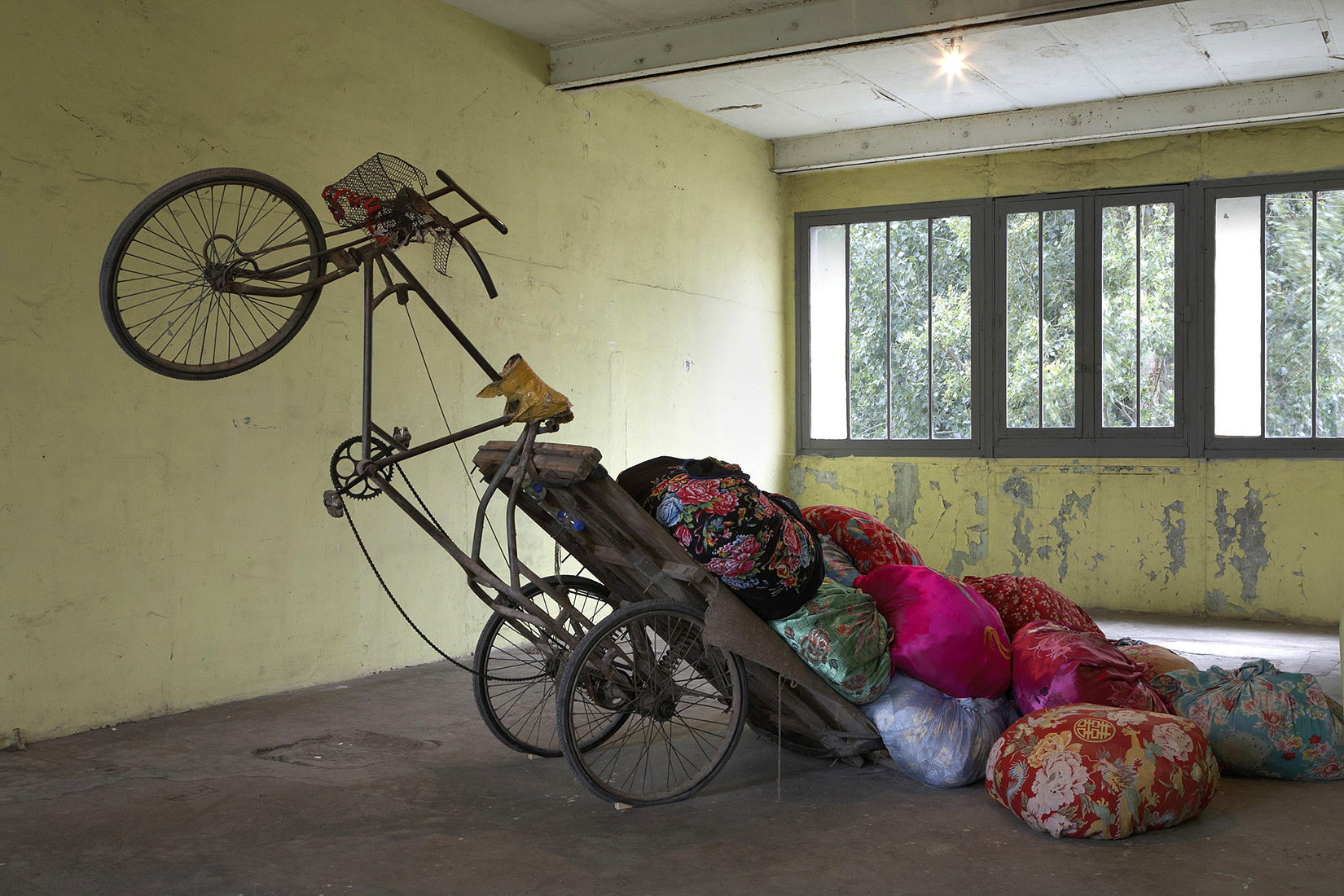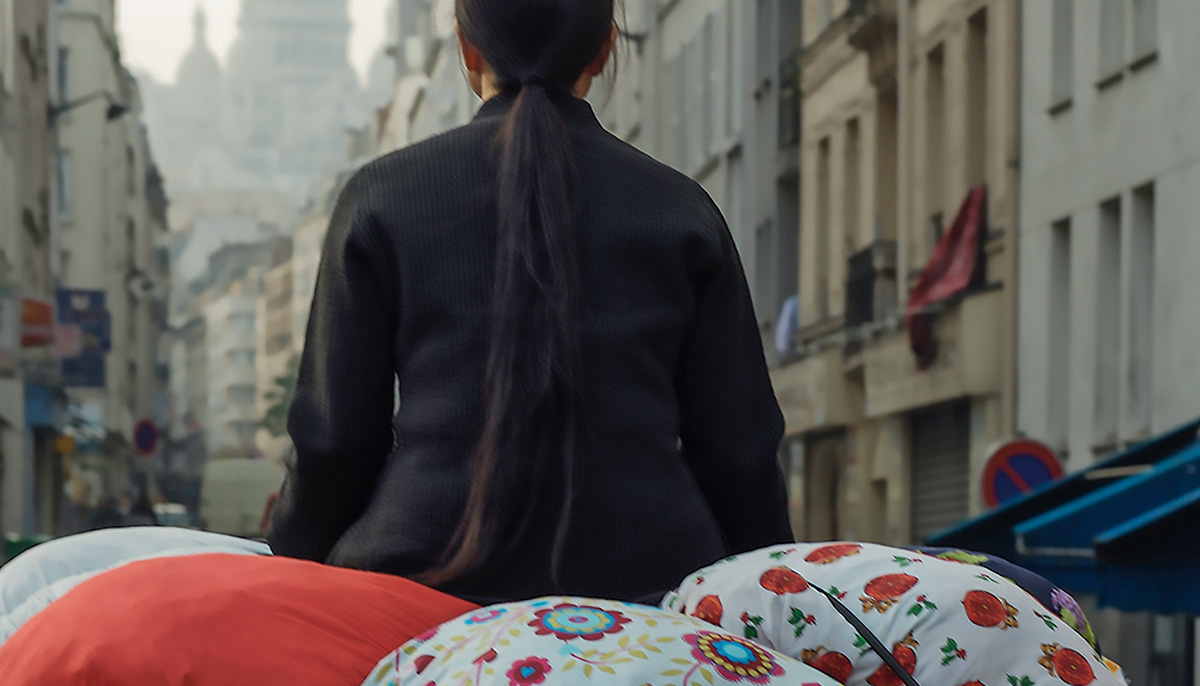You can often hear Western meditation-based convert circles use the term “cultural baggage” to refer to the ritualized acts, cosmological ideas, and devotional practices associated with “heritage” Buddhist communities. This is in contrast to the idea of a more “authentic” or “true” Buddhism that is consonant with a modern rationalized worldview. In my research among meditation-centric convert Buddhist communities, I consistently observe a reluctance to take “heritage Buddhist” practices and cosmologies seriously, with many of my interlocutors often commenting on these ideas’ incompatibility with their own interpretation of Buddhism.
For diasporic Asian Buddhists like myself in the United States, where immigrants are expected to assimilate and to “leave their cultural baggage at the door,” the term “cultural baggage” is of course laced with a pejorative sentiment. After all, the “baggage” imagery implies something one carries at all times, a burdensome hindrance that interferes in one’s freedom of movement. If to be American is to idealize freedom and hyper-individualism, having cultural baggage suggests a sense of being weighted and burdened, being held down by one’s inheritance and the cultural specificities of ancestral heritages. Indeed, in the context of Anglophone understandings of Buddhism in the United States, where claims over what is “authentic Buddhism” depend upon disentangling and freeing the “true” teachings of the dharma from its perceived “religious” or “traditional” features, the weight of cultural baggage for Asian diaspora Buddhists can be uncomfortable, to say the least.
For some of us, especially second-generation Asian American Buddhists, this weight of cultural baggage has meant a tenuous struggle around distancing ourselves from the devotional practices of ritual and worship. For others, it has involved a disaffiliation from religious institutions such as temples, churches, and dojos, or it has manifested as a strong aversion to the social and political imbrications of Buddhism. For myself, as a Sinhalese Buddhist Sri Lankan American, this has sometimes entailed a strong desire to distance myself from certain aspects of Buddhism, such as the ethno-religious Buddhist nationalism that has had violent implications for minorities in Sri Lanka. This option—to abstract some form of romanticized “pure dharma” from any relationship to lived tradition and culture, to free Buddhism from its ongoing and historical transformation—can sometimes seem to hold the promise of freeing us from our liability as active subjects in the making of Buddhism.
I propose a disruption of the taken-for-granted normative understanding of cultural baggage. I suggest we, as Asian American Buddhists, reimagine the notion of cultural baggage in a way that centers our needs and concerns in relation to our communities and the broader society we are embedded in; I suggest we claim this weighty baggage as a mark of our responsibility to our community, of our belonging, and of our accountability to what others in our communities are doing.
As Asian diasporic and Asian American Buddhists, what is our responsibility? There is, of course, our responsibility to our temples and churches as institutions. But there is also the need to recognize the contributions and role that such institutions play in serving our communities; in doing so, we can resist certain moves within the mainstream to erase the contributions of Asian and Asian American Buddhists in the development of Buddhism in the US. At the same time, it is important that we pay careful attention and scrutiny to how our communities and sanghas cause harm and violence toward vulnerable others, here and elsewhere.
Simply put, to claim one’s baggage is to take refuge in the sangha. But it is also to understand that, at times, it is necessary to disrupt our sanghas, to interrupt the ways in which our communities can actively and passively contribute to systemic forms of violence.

Reclaiming Baggage
“We’ve been paying the monthly electricity bill of the Sri Lankan temple for the past twenty years.” I was sharing a car ride with my sister a few weeks back when she very casually shared this detail with me. It has been nearly two decades since my sister and her husband moved from Georgia to upstate New York, yet for all those years, the two have continued to make a standing donation (dana) to the Sri Lankan temple they once regularly attended in Georgia. It was my first time hearing about this, and I was struck by the recognition that they are not alone. Thousands of other first- and second-generation Asian American Buddhists around the country take a similar approach, quietly and consistently fulfilling their responsibilities and commitments to their Buddhist temples.
It reminded me of Chenxing Han’s recent book Be the Refuge, in which she shares a letter written in 1992 by Rev. Ryo Imamura in response to a comment made by the then-editor of Tricycle. “Asian American Buddhists,” Twerkov wrote, “had not figured prominently in the development of something called American Buddhism.” Imamura rebuked this claim, saying, “I would like to point out that it was my grandparents and other immigrants from Asia who brought and implanted Buddhism in American soil over one hundred years ago, despite white American intolerance and bigotry.” He continued, “White Buddhist centers rise and fall dramatically like the ocean waves, whereas Asian temples seem to persist uneventfully and quietly through the generations.”
To claim one’s baggage is to take refuge in the sangha. But it is also to understand that, at times, it is necessary to disrupt our sanghas.
This quiet persistence by the Asian Buddhist community in the United States can be seen in all the unseen little acts of responsibility by laypeople toward their temples and churches. From paying the temple utility bills to literally keep the lights on day to day, to the behind-the-scenes work done mostly by laywomen to ensure the regular activities of the temple run smoothly, little acts of labor and generosity play a pivotal part in sustaining the community.
Such acts of giving and service by laypeople have a long historical precedence in the social histories of Buddhism. Numerous scholarly works in Buddhist studies have shown how across South Asia, Southeast Asia, and East Asia, dana has played a central role in sustaining the social fabric of Buddhist culture. Indeed, these moral investments have been fundamental to financing various Buddhist monastic orders’ transnational transmission and proselytism of the dharma across Asia. In my research in contemporary Sri Lanka, I have found that these forms of patronage are fundamental to the sustenance and continuation of the religious establishment, while monastic institutions in turn play a vital role in the material and spiritual sustenance of the lay community.
In the United States, where many Asian American Buddhist communities have taken root, it is through these manifold reciprocal acts of responsibility between the laity and their temples that churches and sanghas have continued and even thrived. Across the country, temples and Buddhist churches operate Sunday schools, sports clubs, and weekly meditations; they offer communal space for social activities but are also important sites of strength and resilience in times of death and loss or life transition, offering spiritual advice in general and facilitating religious ceremonies (such as for pregnancies/births, funerals, weddings, the blessing of new businesses, and so on). In times of hostility and violence toward immigrants, these institutions also offer much-needed sanctuary to individuals facing hardship such as housing/food insecurity and the struggles of being undocumented.
In what ways might these social bonds and ties of reciprocity help us rethink the meaning of cultural baggage? How might a notion of cultural baggage as a mark of responsibility and accountability to community present a challenge to the sometimes individualistic self-cultivation orientation to Buddhism in the West? So often, the individualism that the American ethos promises us—one undergirded by a Protestant sense of unmediated self-reliance—is really grounded in an imagined capacity for self-determination, a belief we can be freed from our place in the collective structures of tradition and society.
As Asian Buddhists, one way to resist this sometimes-unwitting enculturation is to keep a firm hold on our cultural baggage. Rev. Cristina Moon, in a Tricycle article titled “From ‘Just Culture’ to a Just Culture,” writes, “It is clear that it is not enough to lift up Asian teachers or ‘pay respect’ to the cultural roots of Buddhism. To truly reverse Asian American erasure, we need competency or fluency in the cultures that allowed Buddhism to survive for over two thousand years.” Moon shares several reorienting practices to guide these efforts, including bringing food and offering help to these institutions. As she notes, “Even though they’re simple, these practices can be challenging to integrate into our lives because they shift the transactional and self-motivated approach we usually bring to encounters in the West, whether we realize it or not.” Indeed, the reorienting practices she shares are each grounded in an attitude of reorientation to culture through lived practice, through which “culture is the dharma brought to life by how we live, not just how we think or talk about it.”
The Weight of What We Carry
Taking ethical responsibility for our cultural baggage is not, however, easy or without trouble.
One of the long-standing legacies of the transmission of Buddhism by Western converts is the construct of an “authentic” dharma freed from the corrosive, corrupting influences of its Asian forebears. As Natalie Quli argued on the Dharma Realm Podcast, “authenticity is a discourse of power.” On the one hand, this power operates by constructing a true Buddhism based on the denial of Buddhism’s ongoing transformation throughout history—for example, an erasure of the non-Western forms of Buddhism in the United States. On the other hand, this power also functions by writing out the history of “bad Buddhists” who act in ways that we do not like. However, this act of distancing—saying “those people” are not really Buddhists—excuses us from being accountable to what other people in our communities are doing.
There are important lessons to take away and apply in the work of reclaiming cultural baggage. If our work entails becoming active members in the making of Buddhism, and therefore partaking in its historical social project, then it also involves an ethical accountability to what others in our communities are doing when their actions cause hurt toward the dispossessed and vulnerable, or when they are exclusionary and overtly sectarian.
I suggest we, as Asian American Buddhists, claim ‘cultural baggage’ as a mark of our responsibility to our community, of our belonging, and of our accountability to what others in our communities are doing.
Whether this be forms of anti-Blackness, Islamophobia, or xenophobia within the Asian American community, manifestations of patriarchy and misogyny here and elsewhere, or marginalization and even violence toward ethnic and religious minorities, there have been numerous instances in which our Buddhist communities have been actively complicit in harm and oppression. Rather than romanticizing some form of “authentic” Buddhism and hiding behind the rose-colored glasses of “Buddhists do not harm,” claiming responsibility for our baggage calls us to ask how we are complicit in these projects—and also how we impact them. Such a task can only be undertaken if we claim our baggage and resist the tendency to renounce our responsibilities as active subjects in the making of Buddhism.
This work is not without challenges and insecurity. As Chenxing Han found in her conversations with second-generation Asian American Buddhists, there is a tension we grapple with between being vocal critics of oppressive systems we witness in our own communities and not wanting to bring disrepute to Asian American Buddhists who are already marginalized, stereotyped, or romanticized within the broader mediascape; minorities carry the double burden of having their individual acts being interpreted to represent the entire community. This is not an issue limited to Buddhists, but one familiar to all minorities living amidst a dominant hegemonic culture.
But to be silenced by this orientalization is also to be defined by the dominant culture’s definition of “normal.” We need therefore to boldly engage; we need to actively reorient our traditions. While fostering and nurturing the various ancestral dharma heritages we find refuge in through acts of support and care, we also need to problematize and question what is given, engaging our communities in the parts that are hard.
What would it be like to have an empathic yet critical engagement with our cultural baggage? There is work to be done here, and I include myself in that work. For many years now, I have distanced myself from the Sinhalese Buddhist Sri Lankan communities in Southern California because of my own discomfort with some of the virulent displays of Buddhist nationalism that remain unexamined or glossed over in the Sri Lankan American Buddhist diaspora. The implications of such xenophobia toward ethnic and religious minorities, namely Tamil and Muslim Sri Lankans, and the sustained political support of ethnoreligious hegemony, have significant impact on the lives of minorities in Sri Lanka and disrupt the social fabric of the country.
On my part, as a scholar of Buddhism and Sri Lanka, engaging with my cultural baggage has so far been largely an academic and pedagogic preoccupation, a project of highlighting both the oppressive and emancipatory articulations of Buddhism in Sri Lanka as well as the operations of racism and whiteness within North American convert Buddhist spaces. The work ahead of me is to transform that learning into active engagement and intervention on these issues—however uncomfortable this may at first be. And I can’t do it alone. Creating such opportunities for disruption requires finding allies, forging bonds with fellow agitators, and creating safe spaces for these conversations to even take place.
This work, however, relies upon an active and unromanticized engagement with our communities of practice. To hold tightly to one’s cultural baggage is to claim, through forms of service and care, both responsibility and belonging. But it is also to act responsibly in ways that can possibly intervene in changing how our communities both actively and passively reproduce systemic forms of violence. Such a stance resists tendencies to view Buddhism in ways that abstract it from its rootedness in culture and history; instead, it grounds us, as Asian Americans, as active participants in the making of Buddhism. It’s how we balance the weight we all carry.


